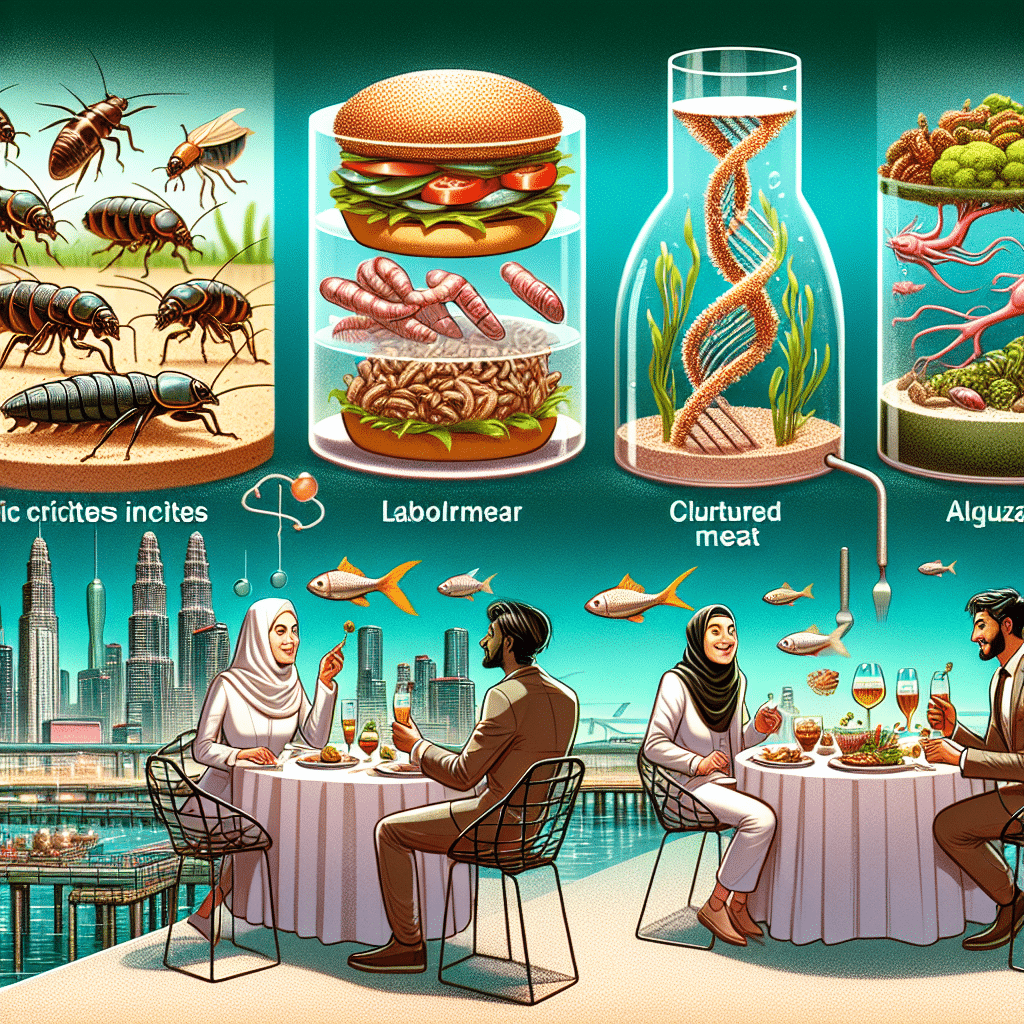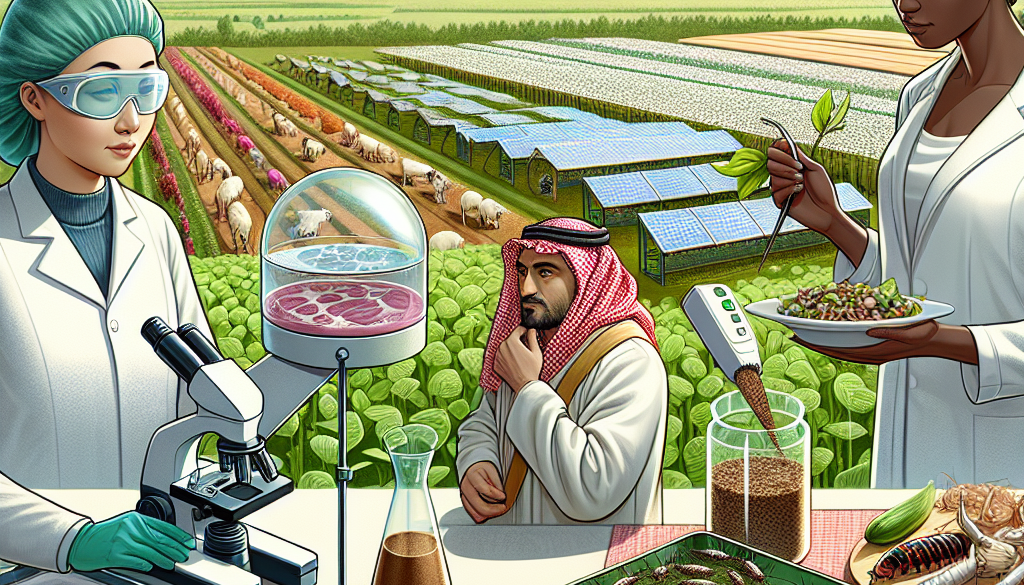Future of Protein: A Journey through Alternative Sources
-
Table of Contents
- Exploring the Future of Protein: Alternative Sources on the Rise
- The Current State of Protein Consumption
- Environmental and Health Impacts of Traditional Protein Sources
- Alternative Protein Sources: A Sustainable Solution
- Plant-Based Proteins
- Insect Protein
- Lab-Grown Meat
- Algae and Microbial Proteins
- Challenges and Opportunities
- Conclusion: Embracing a Diverse Protein Portfolio
- ETprotein: Your Partner in Alternative Protein Solutions
Exploring the Future of Protein: Alternative Sources on the Rise

The quest for sustainable and healthy protein sources is a critical challenge facing our global food system. As the world’s population continues to grow, reaching an estimated 9.7 billion by 2050, the demand for protein will inevitably rise. Traditional animal-based proteins are resource-intensive and pose environmental concerns, leading to a surge in interest in alternative protein sources. This article delves into the future of protein, exploring innovative and sustainable options that are gaining traction.
The Current State of Protein Consumption
Protein is a vital macronutrient essential for building and repairing tissues, making enzymes and hormones, and supporting overall health. The global protein market is currently dominated by animal-based sources such as meat, fish, eggs, and dairy. However, these traditional sources come with significant environmental footprints, including high water usage, greenhouse gas emissions, and land degradation.
Environmental and Health Impacts of Traditional Protein Sources
Animal agriculture is one of the largest contributors to climate change, responsible for an estimated 14.5% of global greenhouse gas emissions. Livestock farming also requires vast amounts of water and land, contributing to deforestation and biodiversity loss. Moreover, excessive consumption of red and processed meats has been linked to health issues such as heart disease, stroke, and certain types of cancer.
Alternative Protein Sources: A Sustainable Solution
As awareness of these issues grows, consumers and industry players are turning to alternative protein sources. These alternatives aim to provide the same nutritional benefits as traditional proteins while minimizing environmental impact and addressing health concerns.
Plant-Based Proteins
- Legumes: Beans, lentils, and chickpeas are excellent sources of protein and fiber.
- Nuts and Seeds: Almonds, chia seeds, and hemp seeds are nutrient-dense options.
- Whole Grains: Quinoa and buckwheat are complete proteins, containing all nine essential amino acids.
Plant-based proteins are associated with lower greenhouse gas emissions and require less land and water than animal-based proteins. They also offer health benefits, such as lower risks of chronic diseases and improved gut health.
Insect Protein
Insects like crickets, mealworms, and black soldier flies are emerging as sustainable protein sources. They have a high feed conversion efficiency, meaning they require less feed to produce the same amount of protein as livestock. Insects also emit fewer greenhouse gases and can be farmed on a smaller scale, making them a promising alternative for the future.
Lab-Grown Meat
Cultured or lab-grown meat is produced by cultivating animal cells in a controlled environment. This technology has the potential to revolutionize the meat industry by offering meat products without the need to raise and slaughter animals. While still in the early stages of commercialization, lab-grown meat could significantly reduce the environmental impact of meat production.
Algae and Microbial Proteins
Algae, such as spirulina and chlorella, are high in protein and other nutrients. Microbial proteins, derived from fungi and bacteria, are also gaining attention. These sources can be produced with minimal land use and can thrive on organic waste streams, making them highly sustainable.
Challenges and Opportunities
Despite the benefits, alternative proteins face challenges in terms of consumer acceptance, taste, texture, and cost. However, ongoing research and innovation are addressing these issues, improving the sensory qualities and reducing production costs.
Investments in alternative protein startups have skyrocketed, indicating strong market potential. According to the Good Food Institute, in 2020, alternative protein companies raised $3.1 billion in investments, three times more than in 2019.
Conclusion: Embracing a Diverse Protein Portfolio
The future of protein is diverse and promising, with alternative sources offering solutions to the environmental and health challenges posed by traditional animal proteins. By embracing a variety of sustainable proteins, we can meet the nutritional needs of a growing population while protecting our planet.
ETprotein: Your Partner in Alternative Protein Solutions
If you’re looking to incorporate high-quality alternative proteins into your diet or products, ETprotein offers a range of organic bulk vegan proteins that cater to various industries. Their selection includes organic rice protein, pea protein, and a variety of seed proteins, all characterized by a neutral taste and non-GMO, allergen-free attributes. ETprotein’s L-(+)-Ergothioneine (EGT) products also provide purity over 98%, suitable for nutraceutical, pharmaceutical, and cosmeceutical applications.
As a trusted supplier for leading global brands, ETprotein is committed to delivering protein solutions that meet the highest standards of quality and sustainability. To explore their offerings and how they can support your protein needs, contact ETprotein and email sales(at)ETprotein.com today.
About ETprotein:
ETprotein, a reputable protein and L-(+)-Ergothioneine (EGT) Chinese factory manufacturer and supplier, is renowned for producing, stocking, exporting, and delivering the highest quality organic bulk vegan proteins and L-(+)-Ergothioneine. They include Organic rice protein, clear rice protein, pea protein, clear pea protein, watermelon seed protein, pumpkin seed protein, sunflower seed protein, mung bean protein, peanut protein, and L-(+)-Ergothioneine EGT Pharmaceutical grade, L-(+)-Ergothioneine EGT food grade, L-(+)-Ergothioneine EGT cosmetic grade, L-(+)-Ergothioneine EGT reference grade and L-(+)-Ergothioneine EGT standard. Their offerings, characterized by a neutral taste, non-GMO, allergen-free attributes, with L-(+)-Ergothioneine purity over 98%, 99%, cater to a diverse range of industries. They serve nutraceutical, pharmaceutical, cosmeceutical, veterinary, as well as food and beverage finished product distributors, traders, and manufacturers across Europe, USA, Canada, Australia, Thailand, Japan, Korea, Brazil, and Chile, among others.
ETprotein specialization includes exporting and delivering tailor-made protein powder and finished nutritional supplements. Their extensive product range covers sectors like Food and Beverage, Sports Nutrition, Weight Management, Dietary Supplements, Health and Wellness Products, and Infant Formula, ensuring comprehensive solutions to meet all your protein needs.
As a trusted company by leading global food and beverage brands and Fortune 500 companies, ETprotein reinforces China’s reputation in the global arena. For more information or to sample their products, please contact them and email sales(at)ETprotein.com today.














